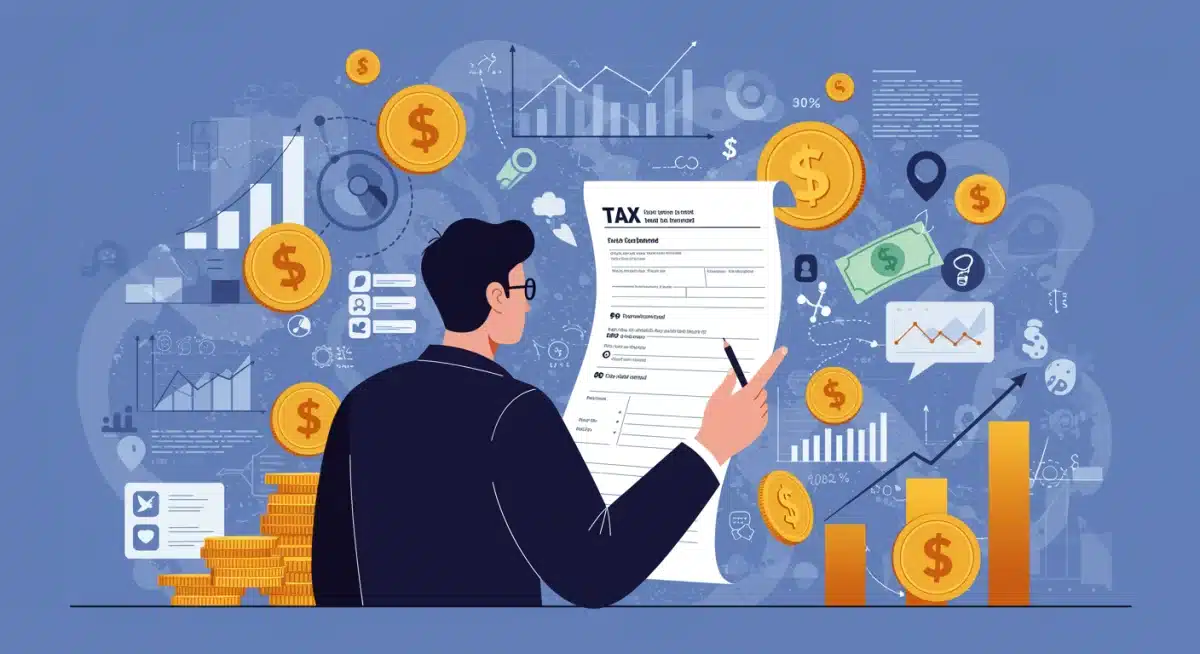2025 Tax Code Changes: Key Deductions for High-Income Earners

Understanding the upcoming 2025 tax code changes is crucial for high-income earners to optimize their financial strategies, focusing on key deductions that can significantly impact their tax liability.
Navigating the complex landscape of 2025 tax deductions can be a daunting task, especially for high-income earners. With impending changes, staying informed is not just beneficial, but essential for optimizing your financial health and minimizing your tax burden. This guide will delve into crucial updates and strategies to help you understand the significant financial impact.
Understanding the 2025 Tax Landscape
The year 2025 is poised to bring significant shifts in the U.S. tax code, largely due to the expiration of several provisions from the Tax Cuts and Jobs Act (TCJA) of 2017. These expirations will directly affect individual income tax rates, deductions, and credits, particularly for high-income earners. Proactive planning is paramount to mitigate potential increases in tax liabilities.
Many of the changes will revert to pre-TCJA rules unless Congress acts to extend them. This means that tax brackets could shift, standard deduction amounts may decrease, and various itemized deduction limitations could be reinstated. Understanding these foundational changes is the first step in crafting an effective tax strategy for the coming year.
Key Expirations and Their Impact
Several critical provisions are set to expire, creating a ripple effect across different income levels. High-income earners, often operating in higher tax brackets, will feel these changes acutely. It’s not just about the rates; it’s about the entire framework of how income is taxed and what can be deducted.
- Individual income tax rates may revert to higher pre-TCJA levels, affecting marginal rates.
- The increased standard deduction amounts are expected to decrease, pushing more taxpayers towards itemizing.
- Limitations on state and local tax (SALT) deductions, previously capped at $10,000, could see adjustments or removal.
The expiration of these provisions means that tax planning strategies employed in recent years may need significant revision. A thorough review of your financial situation and a forward-looking approach are critical to adapt successfully to the evolving tax environment.
Deduction 1: Strategic Charitable Contributions
For high-income earners, charitable contributions often represent a significant opportunity for tax deductions. In 2025, with potential changes to other deduction areas, optimizing your charitable giving strategy becomes even more important. Understanding the rules for cash contributions, appreciated assets, and various giving vehicles can yield substantial tax benefits.
Donating to qualified charitable organizations can reduce your adjusted gross income (AGI), which in turn lowers your overall tax liability. The IRS provides specific guidelines on what constitutes a qualified donation and the limits associated with such contributions. For those with substantial wealth, strategic giving can also play a role in estate planning.
Maximizing Your Charitable Impact
Beyond simply writing a check, there are sophisticated ways to maximize the tax efficiency of your charitable giving. Donating appreciated securities, for instance, can allow you to avoid capital gains tax on the appreciation while still receiving a deduction for the fair market value of the assets. This dual benefit makes it a powerful tool for high-net-worth individuals.
- Consider a Donor-Advised Fund (DAF) for flexibility and immediate tax deduction.
- Gift appreciated stock to avoid capital gains tax and receive a fair market value deduction.
- Explore Qualified Charitable Distributions (QCDs) from IRAs if you are over 70.5 years old.
Planning your charitable contributions strategically requires foresight and an understanding of your long-term financial and philanthropic goals. Consulting with a financial advisor can help tailor a plan that aligns with both your values and your tax optimization objectives.
Deduction 2: Advanced Retirement Planning Contributions
Retirement accounts offer some of the most powerful tax deferral and deduction opportunities available, particularly for high-income earners. Maximizing contributions to 401(k)s, IRAs, and other qualified plans can significantly reduce your taxable income in 2025 and beyond. These vehicles not only provide tax benefits but also secure your financial future.
The IRS sets annual contribution limits for various retirement accounts, which often increase with inflation. High-income earners should aim to contribute the maximum allowed to pre-tax accounts, as these contributions are deductible from current income. This strategy effectively lowers your taxable income, placing you in a potentially lower tax bracket.
Exploring Advanced Retirement Strategies
Beyond traditional contributions, high-income individuals can explore advanced strategies like backdoor Roth IRAs, mega backdoor Roths, and defined benefit plans. These options allow for greater tax-advantaged savings, often exceeding the limits of standard employer-sponsored plans.
- Maximize 401(k) contributions, including catch-up contributions if eligible.
- Utilize backdoor Roth IRA strategies to contribute to Roth IRAs despite income limitations.
- Consider a Solo 401(k) or SEP IRA if you are self-employed or own a business.
The benefits of these advanced strategies extend beyond immediate tax deductions. They also contribute to substantial tax-deferred growth, allowing your investments to compound over time without annual tax liabilities. This long-term perspective is crucial for comprehensive wealth management.
Deduction 3: Business Expenses and Investment Interest
For high-income earners who are also business owners, entrepreneurs, or active investors, various business expenses and investment interest deductions can provide significant tax relief. Understanding which expenses are deductible and how to properly categorize them is key to maximizing these benefits in 2025.
Ordinary and necessary business expenses are generally deductible, reducing your business’s taxable income. This includes everything from office supplies and travel to professional development and employee salaries. For investors, interest paid on money borrowed to purchase investments can also be deductible, though specific limitations apply.


Optimizing Business and Investment Deductions
To fully leverage these deductions, meticulous record-keeping and a clear understanding of IRS regulations are essential. Business owners should categorize expenses carefully, separating personal from business costs. Investors need to track interest payments and ensure they meet the criteria for deductibility.
- Maintain detailed records for all business expenses, categorizing them appropriately.
- Consult with a tax professional to ensure compliance and maximize deductions for investment interest.
- Explore qualified business income (QBI) deductions if you operate a pass-through entity.
The interplay between business operations, investment activities, and tax implications is complex. Proactive engagement with tax professionals can uncover opportunities and ensure compliance, ultimately leading to substantial savings for high-income individuals.
The Role of Professional Tax Advice in 2025
Given the complexity and dynamic nature of the 2025 tax code changes, relying on professional tax advice is not just a luxury but a necessity for high-income earners. A qualified tax advisor can provide personalized guidance, identify all applicable deductions, and help you navigate the intricacies of tax law. Their expertise can prevent costly errors and unlock significant savings.
Tax laws are constantly evolving, and what worked last year may not be optimal for 2025. Professionals stay abreast of legislative changes, IRS rulings, and new planning strategies. They can offer insights into how specific changes impact your unique financial situation, providing a tailored approach to tax optimization.
Choosing the Right Advisor
Selecting a tax professional requires careful consideration. Look for advisors with experience in high-net-worth tax planning, a strong understanding of current tax laws, and a commitment to ongoing education. The right advisor will be a strategic partner in your financial journey, not just someone who prepares your annual return.
- Seek advisors specializing in high-net-worth individuals and complex tax situations.
- Ensure your advisor has up-to-date knowledge of the impending 2025 tax changes.
- Prioritize advisors who offer comprehensive financial planning beyond just tax preparation.
Engaging with a knowledgeable tax professional can transform your tax planning from a reactive annual event into a proactive, year-round strategy. This partnership is invaluable in ensuring you are always positioned to take advantage of every legitimate deduction and credit available.
Long-Term Financial Impact and Planning
The 2025 tax code changes are not merely a one-time event; they have long-term implications for your financial planning and wealth accumulation. High-income earners must consider how these changes will affect their investment strategies, retirement goals, and estate plans. A holistic approach to financial planning is essential to build and preserve wealth effectively.
Understanding the interplay between tax policy and your financial objectives allows for more informed decision-making. For instance, changes in capital gains rates or estate tax exemptions could necessitate adjustments to your investment portfolio or gifting strategies. Long-term planning ensures that you adapt to these shifts rather than being caught unprepared.
Integrating Tax Planning with Overall Financial Goals
Successful long-term financial planning integrates tax considerations into every aspect of your financial life. This means working with a team of advisors—including financial planners, tax professionals, and estate attorneys—to create a cohesive strategy that optimizes for both growth and tax efficiency. This integrated approach minimizes leakage due to taxes and maximizes your net worth.
- Regularly review and adjust your investment portfolio based on tax law changes.
- Incorporate tax efficiency into your estate planning to minimize future tax burdens.
- Continuously monitor legislative developments that could impact your financial future.
By taking a proactive, long-term view of tax planning, high-income earners can turn potential challenges into opportunities. This strategic foresight is critical for navigating the complexities of the tax code and achieving lasting financial security and prosperity.
| Key Deduction Area | Brief Description & Impact |
|---|---|
| Charitable Contributions | Leveraging DAFs and appreciated assets to reduce AGI and avoid capital gains. |
| Retirement Planning | Maximizing 401(k) and IRA contributions; exploring backdoor Roth strategies. |
| Business & Investment Expenses | Deducting ordinary business costs and investment interest with meticulous records. |
| Professional Tax Advice | Essential for navigating complex changes and optimizing personalized tax strategies. |
Frequently Asked Questions About 2025 Tax Changes
The main drivers are the expirations of several provisions from the Tax Cuts and Jobs Act (TCJA) of 2017. These include adjustments to individual income tax rates, standard deduction amounts, and various itemized deduction limitations that will revert to pre-TCJA rules unless extended by Congress.
While the rules for charitable contributions themselves may not drastically change, their relative importance as a deduction strategy will increase. High-income earners can continue using Donor-Advised Funds (DAFs) and appreciated securities to maximize their tax benefits, potentially offsetting other increased liabilities.
Contribution limits for retirement accounts like 401(k)s and IRAs are typically adjusted annually for inflation, not directly by TCJA expirations. High-income earners should always aim to maximize these contributions, exploring advanced strategies like backdoor Roth IRAs to optimize tax-advantaged savings.
The $10,000 cap on State and Local Tax (SALT) deductions is set to expire. If not extended, this could significantly benefit high-income earners in high-tax states, allowing them to deduct a much larger portion of their state and local taxes, thereby reducing their federal taxable income.
The expiring TCJA provisions introduce significant complexities and uncertainties. A qualified tax advisor can provide tailored strategies, ensure compliance with evolving laws, identify all applicable deductions, and help high-income earners proactively adapt their financial plans to minimize tax liabilities and maximize savings.
Conclusion
The 2025 tax code changes present both challenges and opportunities for high-income earners. By focusing on strategic charitable contributions, maximizing retirement planning, and meticulously managing business and investment expenses, individuals can significantly optimize their tax position. Engaging with seasoned tax professionals is not merely advisable but essential to navigate these complexities effectively, transforming potential liabilities into opportunities for sustained financial growth and security. Proactive planning and a deep understanding of these shifts are your best allies in the evolving tax landscape.





